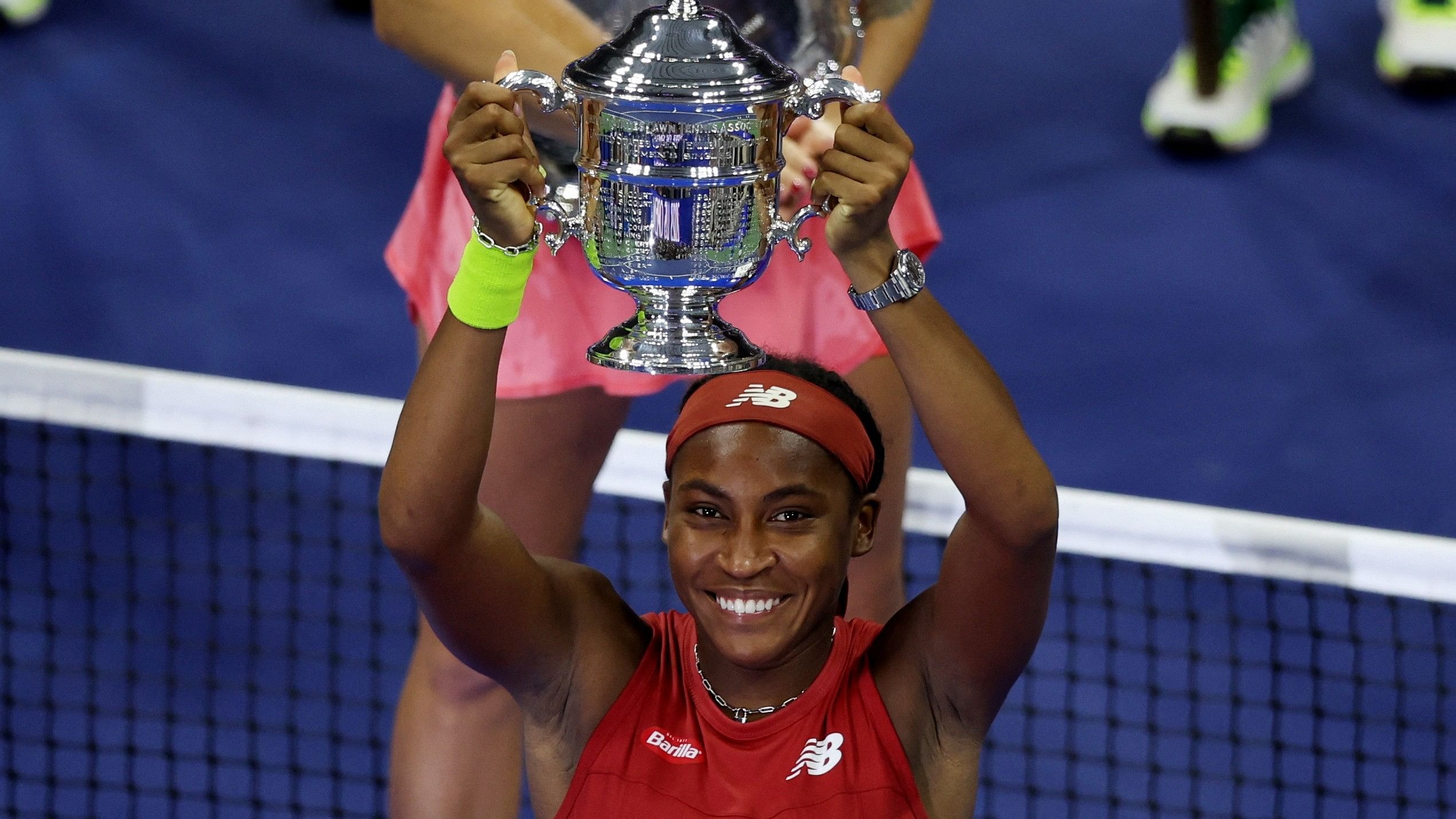
Coco Gauff of the US celebrates with the trophy after winning the US Open.
Credit: Reuters Photo
With a stirring, three-set, back-from-the-dead win that sent the world’s biggest tennis stadium into a state of delirium, Coco Gauff, the 19-year-old prodigy who seemed destined for this since her early teens, captured her first Grand Slam title, winning the US Open singles final, 2-6, 6-3, 6-2, over Aryna Sabalenka of Belarus.
In front of a star-studded crowd that included the likes of Kevin Durant, Spike Lee, Nicole Kidman and Charlize Theron, Gauff started tight and shaky and was bullied around the court early on, but she chased and lunged toward ball after ball, rattling Sabalenka into the errors that often emerged from her racket at the most inconvenient times.
Down a set and fighting just to stay in games, Gauff’s signature fist-pumps and shouts of “Come on!” took on that desperate Serena Williams quality that made special so many September Saturdays in this building over the past two-plus decades. Each sent more noise bouncing off the walls and the roof, helping to wither Sabalenka’s spirit as it did with Gauff’s six previous victims in this tournament.
Sabalenka will become the new world No. 1 Monday, a mark of her prowess all year that included the Australian Open title. But this — and Gauff — were too much.
Gauff teetered briefly in the third set, losing her serve with a 4-1 lead to give Sabalenka hope for a stirring comeback of her own. But in the next game, Gauff went ball-chasing once more, and got to within a game of the championship with the looping forehand, stinging put-away combination that has become the signature of her play during this last transformative month of her career — which culminated Saturday with a new A-lister of sports and culture.
Gauff’s victory was a coronation of sorts for the new face of the sport in America.
Since she first broke through with victory over Venus Williams on Centre Court at Wimbledon in 2019, Gauff’s rise to the elite of the sport was more a question of when rather than if. That ascent took on a new urgency when Serena Williams, widely considered the greatest player of the modern era, said she would step away from tennis after her final match at this tournament last year.
Gauff, who grew up in Delray Beach, Florida, figured to be the most likely candidate as the face of tennis. She had dominated her age group since she was a small girl and won the U.S. Open junior title when she was just 13. Two years later she cruised into the fourth round at Wimbledon, which instantly turned her into a major figure in tennis and a minor celebrity outside of it.
As she rose through the tennis ranks, she also became increasingly outspoken on civil rights issues. Gauff has long spoken about the impact of her grandmother, Yvonne Lee Odom, who in 1961 was selected to be among the first women to integrate her high school in Palm Beach County, a risky endeavor at a time when the children tasked with that kind of trailblazing were often met with taunts and threats of violence.
Nearly 50 years later, when she was 16, Gauff took the microphone at a Black Lives Matter protest in her hometown following the murder of George Floyd in 2020.
“This is not just about George Floyd,” she said before listing other Black Americans who died as a result of police violence or supposed vigilante justice. “This is about Trayvon Martin. This is about Eric Garner. This is about Breonna Taylor. This is about stuff that’s been happening. I was 8 years old when Trayvon Martin was killed. So why am I here at 16 still demanding change? And it breaks my heart because I’m fighting for the future of my brothers. I’m fighting for the future of my future kids. I’m fighting for the future of my future grandchildren. So, we must change now.”
Friday night, after a climate change protest interrupted her semifinal win over Karolina Muchova, Gauff didn't gripe but rather spoke about her belief in the cause and the rights of people everywhere to protest peacefully for the change they believe in.
“I always speak about preaching, you know, preaching about what you feel and what you believe in,” she said. “It was done in a peaceful way, so I can’t get too mad at it. Obviously I don’t want it to happen when I’m winning, up 6-4, 1-0 and I wanted the momentum to keep going. But hey, if that’s what they felt they needed to do to get their voices heard, I can’t really get upset at it.”
But sports journeys don’t always follow the narratives that fans hope they might. During the last two seasons, Gauff had to work through struggles with her second serve and a shaky forehand that opponents at the highest level always seemed able to exploit. She lost decisively in the French Open final last year to Iga Swiatek, and since had grown frustrated by her inability to advance beyond the quarterfinals in the biggest tournaments.